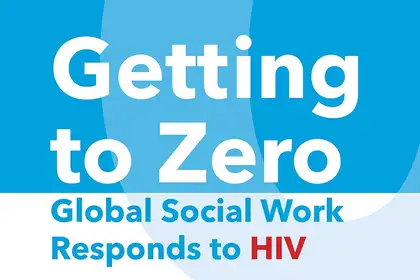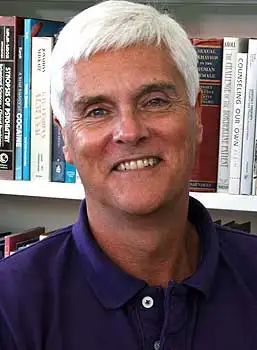
The cover of Getting to Zero: Global Social Work Responds to HIV.
With 2030 fast approaching, the goal of ending the world HIV/AIDS epidemic is an ambitious one. Now a new joint publication from the International Association of Schools and Social Work (IASSW) and the Joint United Nations Programme on HIV/AIDS (UNAIDS), gives renewed global focus to the Getting to Zero strategy.
Associate Professor Mark Henrickson, from Massey University’s School of Social Work, served as Editor in Chief, working with a team of editors from every region of the world. The 488-page book provides an unprecedented international snapshot of the HIV/AIDS situation across 18 chapters, covering Brazil, Canada, the Caribbean, Ethiopia, Germany, India, Mozambique, Scotland, South Africa, sub-Saharan Africa, Ukraine, United States and Zimbabwe.
Dr Henrickson says it is clear HIV is more than a medical condition. “HIV occurs in psychosocial, political and economic contexts that directly shape individual, community and government responses to HIV. Now that new medications have made HIV a manageable, lifelong condition, making those medications available, and assisting individuals and communities to access antiretroviral treatments and prevention technologies is an urgent undertaking. What this book demonstrates is how social workers around the world are taking up that challenge creatively and compassionately.”
When editors first put out a call for contributions they received responses from 68 individuals and partnerships from around the globe, he says. “The editorial challenge was to identify the work that best represents social work responses to HIV that would be most useful to social workers who work with people and communities affected by HIV. Each chapter’s abstract appears in the five languages of IASSW - English, Chinese, Spanish, Japanese and French. German, Portuguese and Ukrainian are also included.”

Editor in Chief Associate Professor Mark Henrickson from the School of Social Work.
Dr Henrickson says the book is about much more than social workers responding to AIDS. “It’s a story told with candour, purpose and direction about restoring the hope, dignity and social capital of vulnerable people and families in the face of significant challenges. It’s also about the lived experiences of people affected by HIV and their caregivers, showing us that it is essential to address poverty, inequality and discrimination in order to prevent or manage HIV.”
In the book’s foreword, executive director of UNAIDS Michel Sidibé says no one can tell this story better than social workers. “Social workers are the conscience of the AIDS response. They are peer educators, researchers and decision-makers, and they work at the centre and margins of our communities, with influencers and vulnerable people. Social workers ground our responses to meet the personalised needs of vulnerable people. They accompany people through their life-cycles, connecting them to services and making services work for them.”
By focusing political and financial resources to apply proven scientific tools and approaches, social workers can help a new generation to start free, remain free and stay free of HIV infection, Mr Sidibé says.
The chapters are organised into four groups, following the UNAIDS ‘Getting to Zero’ themes:
- Zero new HIV infections
- Zero discrimination
- Zero AIDS-related deaths
- The fourth group includes examples of trans-thinking that is so common among social workers, meaning responses are not limited to a particular zero-theme, or country or level of engagement.
The book can be downloaded for free here.